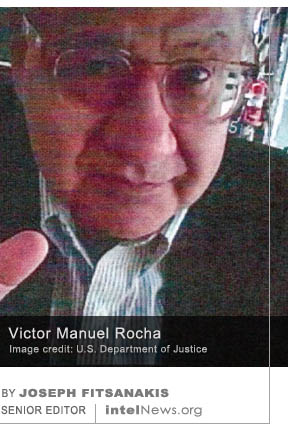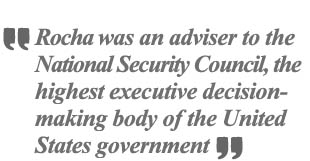December 11, 2023
by Joseph Fitsanakis
 LAST WEEK THE UNITED States Department of Justice announced the arrest of Victor Manuel Rocha, 73, a former senior American diplomat, whose career included stints as ambassador and advisor to the National Security Council and the United States Southern Command. Cuban intelligence allegedly recruited Rocha when he was a student in the 1970s and inspired him to spend his entire professional life in search of opportunities to supply intelligence to Cuba —and possibly Russia and China. United States Attorney General Merrick Garland said Rocha’s case was “one of the highest-reaching and longest-lasting infiltrations” of the US government by a foreign agent. This may be an understatement.
LAST WEEK THE UNITED States Department of Justice announced the arrest of Victor Manuel Rocha, 73, a former senior American diplomat, whose career included stints as ambassador and advisor to the National Security Council and the United States Southern Command. Cuban intelligence allegedly recruited Rocha when he was a student in the 1970s and inspired him to spend his entire professional life in search of opportunities to supply intelligence to Cuba —and possibly Russia and China. United States Attorney General Merrick Garland said Rocha’s case was “one of the highest-reaching and longest-lasting infiltrations” of the US government by a foreign agent. This may be an understatement.
A STORIED CAREER IN GOVERNMENT
Rocha was born in Colombia in 1950, but grew up in New York City after his mother emigrated to the United States. In 1965, the studious Rocha earned a full-ride scholarship to a prestigious boarding school in Connecticut. This enabled him to earn an undergraduate degree from Yale University in 1973, before completing master’s degrees in public administration and foreign affairs from Harvard University and Georgetown University.
After receiving his security clearance from the Department of State, Rocha relied on his advanced social skills and native command of the Spanish language to quickly rise through the ranks of the diplomatic corps. Within a decade he had served prestigious assignments in Argentina, Honduras, Italy, Mexico, and the Dominican Republic, where he held the post of deputy chief of mission. In the mid-1990s, Rocha served as deputy  principal officer in the United States Interests Section in Cuba —effectively the second-in-command in Washington’s de facto embassy in Havana.
principal officer in the United States Interests Section in Cuba —effectively the second-in-command in Washington’s de facto embassy in Havana.
Rocha’s diplomatic career culminated with the post of ambassador to Bolivia, from which he abruptly resigned in 2002. He did so reportedly in order to pursue employment in the private sector and raise funds for his children’s college education. Prior to the end of his State Department career, however, Rocha had managed to hold posts as a Latin America adviser to the National Security Council, which is the highest executive decision-making body of the United States government. He had also served as an adviser to the United States Southern Command (USSOUTHCOM), which oversees all activities of the Department of Defense in Central and South America, including the Caribbean.
FORMING REVOLUTIONARY LEFTIST IDEALS
By 1978, when he became a United States citizen, the young Rocha had spent time in Chile. While there, he witnessed first-hand the turbulence of Chilean politics in the lead-up to the military coup of 1973, which cut short the presidency of leftist icon Salvador Allende. Washington’s role in the coup, and in the ensuing junta of General Augusto Pinochet, appears to have steered Rocha’s politics decisively to the left. It was in fact in Chile where, according to the Federal Bureau of Investigation (FBI), Rocha was recruited by the Dirección de Inteligencia (DI, also referred to by its former acronym, DGI). Read more of this post
A senior American diplomat spied for Cuba for 42 years. How serious is this case?
December 11, 2023 by Joseph Fitsanakis 4 Comments
A STORIED CAREER IN GOVERNMENT
Rocha was born in Colombia in 1950, but grew up in New York City after his mother emigrated to the United States. In 1965, the studious Rocha earned a full-ride scholarship to a prestigious boarding school in Connecticut. This enabled him to earn an undergraduate degree from Yale University in 1973, before completing master’s degrees in public administration and foreign affairs from Harvard University and Georgetown University.
After receiving his security clearance from the Department of State, Rocha relied on his advanced social skills and native command of the Spanish language to quickly rise through the ranks of the diplomatic corps. Within a decade he had served prestigious assignments in Argentina, Honduras, Italy, Mexico, and the Dominican Republic, where he held the post of deputy chief of mission. In the mid-1990s, Rocha served as deputy principal officer in the United States Interests Section in Cuba —effectively the second-in-command in Washington’s de facto embassy in Havana.
principal officer in the United States Interests Section in Cuba —effectively the second-in-command in Washington’s de facto embassy in Havana.
Rocha’s diplomatic career culminated with the post of ambassador to Bolivia, from which he abruptly resigned in 2002. He did so reportedly in order to pursue employment in the private sector and raise funds for his children’s college education. Prior to the end of his State Department career, however, Rocha had managed to hold posts as a Latin America adviser to the National Security Council, which is the highest executive decision-making body of the United States government. He had also served as an adviser to the United States Southern Command (USSOUTHCOM), which oversees all activities of the Department of Defense in Central and South America, including the Caribbean.
FORMING REVOLUTIONARY LEFTIST IDEALS
By 1978, when he became a United States citizen, the young Rocha had spent time in Chile. While there, he witnessed first-hand the turbulence of Chilean politics in the lead-up to the military coup of 1973, which cut short the presidency of leftist icon Salvador Allende. Washington’s role in the coup, and in the ensuing junta of General Augusto Pinochet, appears to have steered Rocha’s politics decisively to the left. It was in fact in Chile where, according to the Federal Bureau of Investigation (FBI), Rocha was recruited by the Dirección de Inteligencia (DI, also referred to by its former acronym, DGI). Read more of this post
Filed under Expert news and commentary on intelligence, espionage, spies and spying Tagged with Analysis, Joseph Fitsanakis, Newstex, Victor Manuel Rocha